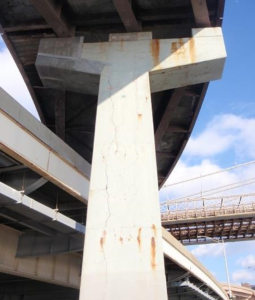 Carbonation of concrete.
Carbonation of concrete.
Carbonation of concrete is caused when moisture penetrates through porous areas of the structure allowing carbon dioxide to react with calcium hydroxide in the cement. (calcium carbonate).
When mixed with water the calcium carbonate forms a paste and can lead to corrosion (rust) of the steel reinforcing bars (Rebars).
As the corrosion builds up the the swelling can cause the concrete to fracture and ultimately breakaway.
For minor works the following solution may be considered but for any major works a structural engineer should be consulted.
Where carbonation has occurred, all defective concrete should be removed and the exposed steel bars should be cleaned to remove all corrosion; followed by priming the steelwork with an anticorrosive primer.
All defective areas of concrete should then be made good as required and allowed to dry.
Painting.
An anti-carbonation coating should be applied in accordance with the manufacturer’s instructions.
Suppliers of anti-carbonation coatings include.
Andura Coatings. https://www.andura.com/contact
New Guard Coatings Limited. https://newguardcoatings.com
Dulux. https://www.duluxtradepaintexpert.co.uk
Johnstones Paints.https://www.johnstonespaint.com/